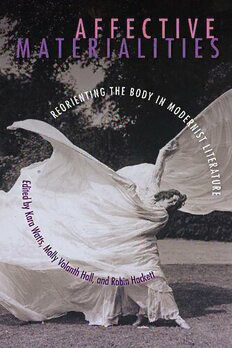
Affective Materialities: Reorienting the Body in Modernist Literature PDF
Preview Affective Materialities: Reorienting the Body in Modernist Literature
Affective Materialities University Press of Florida Florida A&M University, Tallahassee Florida Atlantic University, Boca Raton Florida Gulf Coast University, Ft. Myers Florida International University, Miami Florida State University, Tallahassee New College of Florida, Sarasota University of Central Florida, Orlando University of Florida, Gainesville University of North Florida, Jacksonville University of South Florida, Tampa University of West Florida, Pensacola AFFECTIVE MATERIALITIES Reorienting the Body in Modernist Literature Edited by Kara Watts, Molly Volanth Hall, and Robin Hackett University Press of Florida Gainesville · Tallahassee · Tampa · Boca Raton Pensacola · Orlando · Miami · Jacksonville · Ft. Myers · Sarasota Copyright 2019 by Kara Watts, Molly Volanth Hall, and Robin Hackett All rights reserved Printed in the United States of America on acid-free paper This book may be available in an electronic edition. 24 23 22 21 20 19 6 5 4 3 2 1 Library of Congress Cataloging-in-Publication Data Names: Watts, Kara, editor. | Hall, Molly Volanth, editor. | Hackett, Robin, 1963– editor. Title: Affective materialities : reorienting the body in modernist literature / edited by Kara Watts, Molly Volanth Hall, and Robin Hackett. Description: Gainesville : University Press of Florida, 2019. | Includes bibliographical references and index. Identifiers: LCCN 2018029687 | ISBN 9780813056289 (cloth : alk. paper) Subjects: LCSH: Modernism (Literature) | English literature—History and criticism. | Literature and science. | Affect (Psychology) | Ecocriticism. | Ecology in literature. Classification: LCC PR888.M63 A44 2019 | DDC 820.9/3561—dc23 LC record available at https://lccn.loc.gov/2018029687 The University Press of Florida is the scholarly publishing agency for the State University System of Florida, comprising Florida A&M University, Florida Atlantic University, Florida Gulf Coast University, Florida International University, Florida State University, New College of Florida, University of Central Florida, University of Florida, University of North Florida, University of South Florida, and University of West Florida. University Press of Florida 2046 NE Waldo Road Suite 2100 Gainesville, FL 32609 http://upress.ufl.edu CONTENTS List of Figures vii Acknowledgments ix 1. Into the Ether: An Invitation to Bodily Reorientations 1 Molly Volanth Hall and Kara Watts 2. Flesh over Granite: Walt Whitman’s Embodied Presence in William Carlos Williams’s “History” 33 Karen Guendel 3. E. M. Forster among the Ruins 55 Stuart Christie 4. “‘I’m not sick,’ I said. ‘I’m wounded’”: Disrupting Wounded Masculinity through the Lyrical Spaces of War 79 Cheryl Hindrichs 5. Frustrated Energies in Modernism’s Female Arrangements 103 Judith Paltin 6. “Things were in people, people were in things”: Language, Ecology, and the Body in H.D. 123 Kim Sigouin 7. Cold Crystal: The Ecology of Affect in Herbert Read’s The Green Child 147 William Kupinse 8. “I wanna be your puppy”: Djuna Barnes’s Nightwood and the Queer Cute Body 172 Anna Christine 9. The Brain and the Living World in Janet Frame’s Faces in the Water 192 Mary Elene Wood 10. “Becoming Animal, Becoming Other”: Modernism, Millennial Jurisprudence, and the Limits of Materialist Subjectivity 213 Kathryn Van Wert 11. Black Girls and Lady Police: Blank Affect and the Ecology of the Gym 236 Robin Hackett List of Contributors 255 Index 259 FIGURES 1.1. Man as Industrial Palace (Der Mensch als Industriepalast), by Fritz Kahn, 1926 15 1.2. Nude Descending a Staircase (No. 2), by Marcel Duchamp, 1912 16 3.1. Hand-drawn map of Alexandria, by E. M. Forster 62 3.2. Kom es Chogafa, by E. M. Forster 65 11.1. Gym sign, no age limits, photo taken by Robin Hackett 247 11.2. Gym sign, age limit of two, photo taken by Robin Hackett 248 11.3. Gym sign, age limit of four, photo taken by Robin Hackett 248 ACKNOWLEDGMENTS The impetus for this collection came from our double panel session, “Touching the Body in Pieces,” at the 2016 meeting of the Northeast Modern Language Association. The work herein would not have been possible without the provocative scholarship and debate that began there, so to those original panelists and audiences, we offer sincere thanks. We also wish to thank our editor at the University Press of Flor- ida, Stephanye Hunter, for taking on our project and supporting it at every stage, as well as Marthe Walters, and the entire team at UPF. We are grateful as well to the two anonymous readers whose encouraging comments and helpful recommendations invariably made this volume stronger. We are indebted to the University of Rhode Island’s Center for the Humanities, which gave financial support for this project in the form of a generous subvention grant. We owe much to the University of Rhode Island and the University of New Hampshire, whose support along with that of our English Department colleagues makes research an even greater pleasure. Finally, we wish to thank profusely our contributors for their patience and hard work—their provocative ideas have made this collection an exciting example of what modernist scholarship can do. We thank New Directions Publishing for allowing us to reproduce portions of works by William Carlos Williams, H.D., and Herbert Read; the Provost and Scholars of King’s College, Cambridge, and the Society of Authors as the literary representatives of the E. M. Forster Estate for allowing us to reproduce portions of works by E. M. Forster; the Estate of Langston Hughes, Penguin Random House, and David Higham As- sociates for allowing us to reproduce a portion of Langston Hughes’s po- etry; the Author’s League Fund and St. Bride’s Church for granting us the ability to reproduce portions of Djuna Barnes’s works; and the Janet
